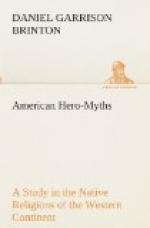The most venerable traditions of the Maya race claimed for them a migration from “Tollan in Zuyva.” “Thence came we forth together,” says the Kiche myth, “there was the common parent of our race, thence came we, from among the Yaqui men, whose god is Yolcuat Quetzalcoat."[1] This Tollan is certainly none other than the abode of Quetzalcoatl, named in an Aztec manuscript as Zivena vitzcatl, a word of uncertain derivation, but applied to the highest heaven.
[Footnote 1: Le Popol Vuh, p. 247. The name Yaqui means in Kiche civilized or polished, and was applied to the Aztecs, but it is, in its origin, from an Aztec root yauh, whence yaque, travelers, and especially merchants. The Kiches recognizing in the Aztec merchants a superior and cultivated class of men, adopted into their tongue the name which the merchants gave themselves, and used the word in the above sense. Compare Sahagun, Historia de Nueva Espana, Lib. ix, cap. xii.]
Where Quetzalcoatl finally retired, and whence he was expected back, was still a Tollan—Tollan Tlapallan—and Montezuma, when he heard of the arrival of the Spaniards, exclaimed, “It is Quetzalcoatl, returned from Tula.”
The cities which selected him as their tutelary deity were named for that which he was supposed to have ruled over. Thus we have Tollan and Tollantzinco ("behind Tollan”) in the Valley of Mexico, and the pyramid Cholula was called “Tollan-Cholollan,” as well as many other Tollans and Tulas among the Nahuatl colonies.
The natives of the city of Tula were called, from its name, the Tolteca, which simply means “those who dwell in Tollan.” And who, let us ask, were these Toltecs?
They have hovered about the dawn of American history long enough. To them have been attributed not only the primitive culture of Central America and Mexico, but of lands far to the north, and even the earthworks of the Ohio Valley. It is time they were assigned their proper place, and that is among the purely fabulous creations of the imagination, among the giants and fairies, the gnomes and sylphs, and other such fancied beings which in all ages and nations the popular mind has loved to create.
Toltec, Toltecatl,[1] which in later days came to mean a skilled craftsman or artificer, signifies, as I have said, an inhabitant of Tollan—of the City of the Sun—in other words, a Child of Light. Without a metaphor, it meant at first one of the far darting, bright shining rays of the sun. Not only does the tenor of the whole myth show this, but specifically and clearly the powers attributed to the ancient Toltecs. As the immediate subjects of the God of Light they were called “Those who fly the whole day without resting,"[2] and it was said of them that they had the power of reaching instantly even a very distant place. When the Light-God himself departs, they too disappear, and their city is left uninhabited and desolate.




